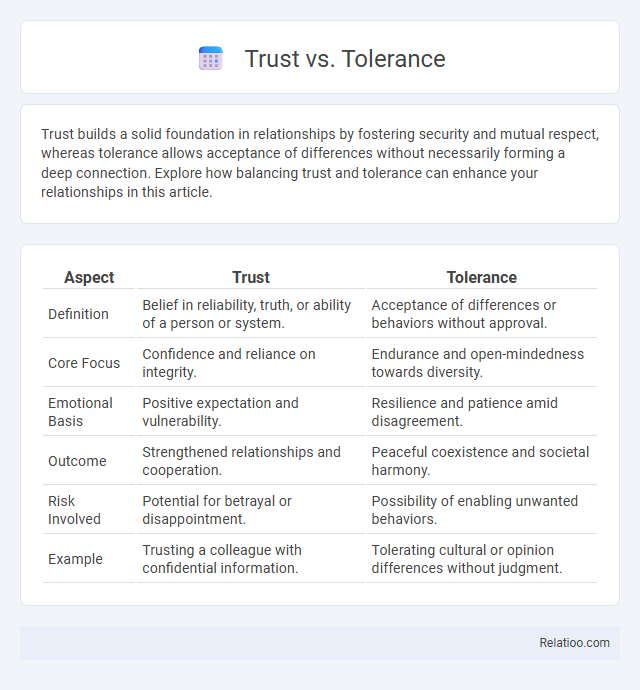Trust builds a solid foundation in relationships by fostering security and mutual respect, whereas tolerance allows acceptance of differences without necessarily forming a deep connection. Explore how balancing trust and tolerance can enhance your relationships in this article.
Table of Comparison
| Aspect | Trust | Tolerance |
|---|---|---|
| Definition | Belief in reliability, truth, or ability of a person or system. | Acceptance of differences or behaviors without approval. |
| Core Focus | Confidence and reliance on integrity. | Endurance and open-mindedness towards diversity. |
| Emotional Basis | Positive expectation and vulnerability. | Resilience and patience amid disagreement. |
| Outcome | Strengthened relationships and cooperation. | Peaceful coexistence and societal harmony. |
| Risk Involved | Potential for betrayal or disappointment. | Possibility of enabling unwanted behaviors. |
| Example | Trusting a colleague with confidential information. | Tolerating cultural or opinion differences without judgment. |
Understanding Trust and Tolerance
Understanding trust involves recognizing it as a firm belief in the reliability, truth, or ability of someone or something, which forms the foundation of strong relationships and effective communication. Tolerance, on the other hand, refers to the willingness to accept or endure different opinions, behaviors, or practices without necessarily agreeing with them. Your ability to balance trust and tolerance can foster empathy and resilience in personal and professional interactions.
The Core Differences Between Trust and Tolerance
Trust involves a confident belief in someone's reliability, honesty, and integrity, forming the foundation of deep interpersonal relationships and effective collaboration. Tolerance, on the other hand, refers to the willingness to accept or endure differing opinions or behaviors without necessarily endorsing them, which can maintain peace but does not imply a positive expectation. Your ability to distinguish between trust and tolerance is crucial for setting appropriate boundaries and fostering healthier interactions.
Origins of Trust: Foundations and Development
Trust originates from early social interactions and is fundamentally shaped by consistent, reliable experiences that reinforce an individual's belief in another's integrity and competence. Its development relies on emotional bonds, transparency, and reciprocal behavior, distinguishing it from tolerance, which merely involves accepting differences without necessarily fostering confidence. Your ability to build trust fundamentally influences the quality and depth of relationships, as trust forms the foundation for cooperation and meaningful connection.
The Role of Tolerance in Diverse Societies
Tolerance plays a crucial role in diverse societies by fostering peaceful coexistence and reducing social conflicts among different cultural, religious, and ethnic groups. It enables individuals to respect and accept differences, promoting social harmony and inclusivity while preventing discrimination and prejudice. By encouraging open-mindedness and empathy, tolerance strengthens community resilience and supports democratic values essential for multicultural integration.
Psychological Factors Influencing Trust and Tolerance
Psychological factors influencing trust include an individual's past experiences, cognitive biases, and emotional regulation, which shape how reliably they perceive others' intentions. Tolerance is affected by openness to diversity, empathy, and levels of anxiety or fear, impacting your ability to accept differing viewpoints or behaviors. Understanding these internal processes helps enhance both trust and tolerance in interpersonal relationships.
Trust vs Tolerance in Relationships
Trust in relationships is the foundation that enables emotional safety and honest communication, fostering deeper connections and mutual respect. Tolerance involves accepting your partner's differences and imperfections without judgment, which can prevent conflicts but may not build true intimacy. Balancing trust with tolerance strengthens your relationship by allowing vulnerability while maintaining patience and understanding.
Building Trust vs Fostering Tolerance at Work
Building trust at work requires consistent honesty, reliability, and transparent communication that foster strong interpersonal relationships and collaboration. Fostering tolerance emphasizes recognizing and respecting diverse perspectives, reducing biases, and creating an inclusive environment where different ideas thrive. Your ability to balance trust-building with promoting tolerance enhances team cohesion, productivity, and overall workplace harmony.
Impacts of Trust and Tolerance on Community Cohesion
Trust fosters strong interpersonal connections by promoting reliability and openness, which enhances cooperation within communities. Tolerance supports social cohesion by encouraging acceptance of diverse perspectives and reducing conflicts. Your ability to balance trust and tolerance shapes a resilient and harmonious community environment.
Trust and Tolerance in Conflict Resolution
Trust in conflict resolution fosters open communication and mutual respect, which are essential for finding lasting solutions. Tolerance allows you to accept differing viewpoints and behaviors, reducing hostility and creating a more collaborative environment. Combining trust and tolerance enhances your ability to navigate conflicts effectively, promoting understanding and compromising where necessary.
Nurturing Trust and Tolerance for a Better Future
Nurturing trust fosters open communication and collaboration, essential for building resilient communities and organizations. Cultivating tolerance promotes acceptance and understanding of diverse perspectives, reducing conflicts and fostering social harmony. Combining trust and tolerance creates a foundation for inclusive growth and a sustainable future.

Infographic: Trust vs Tolerance
 relatioo.com
relatioo.com